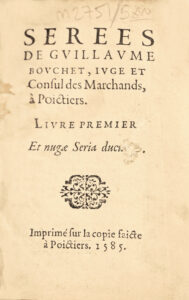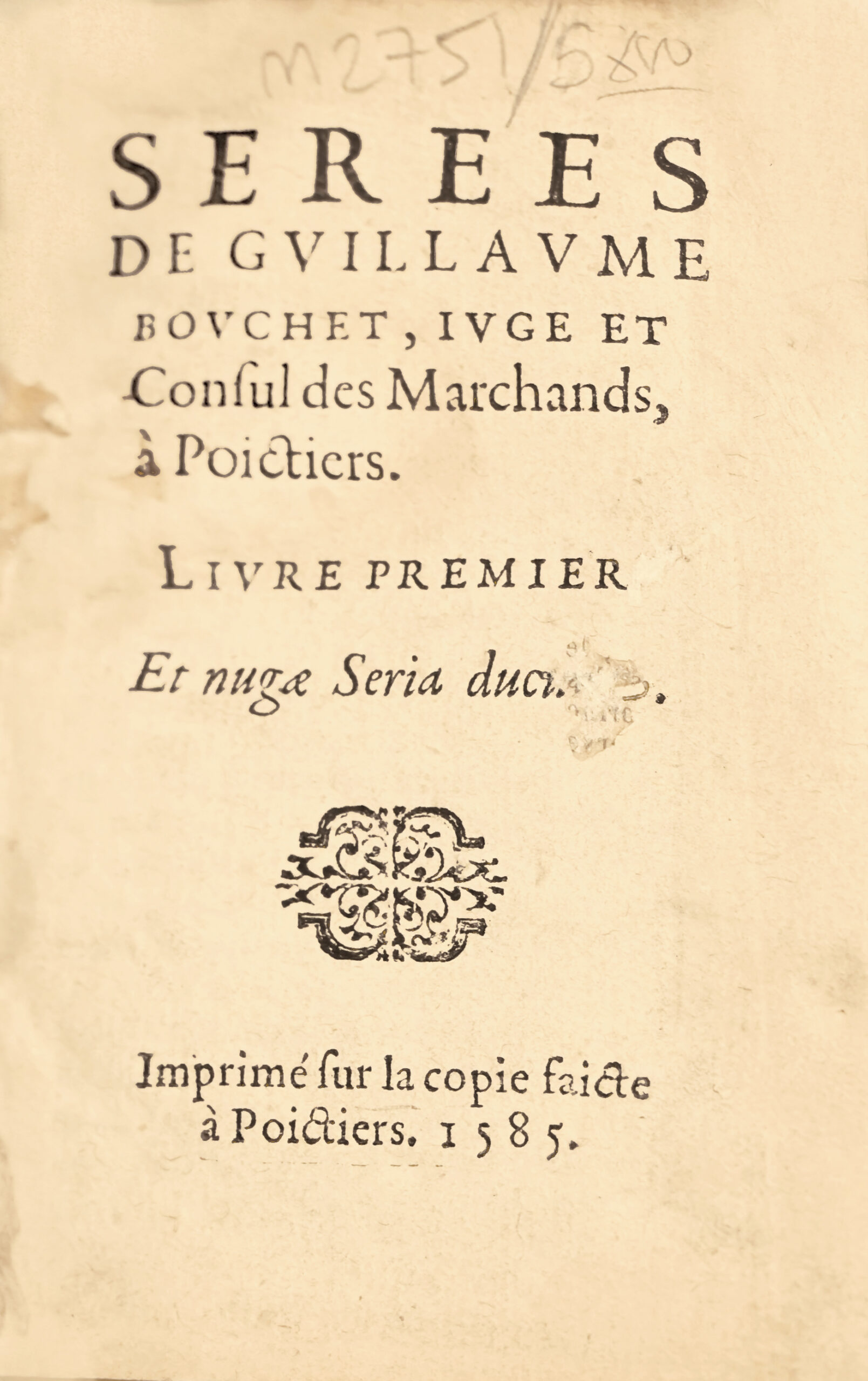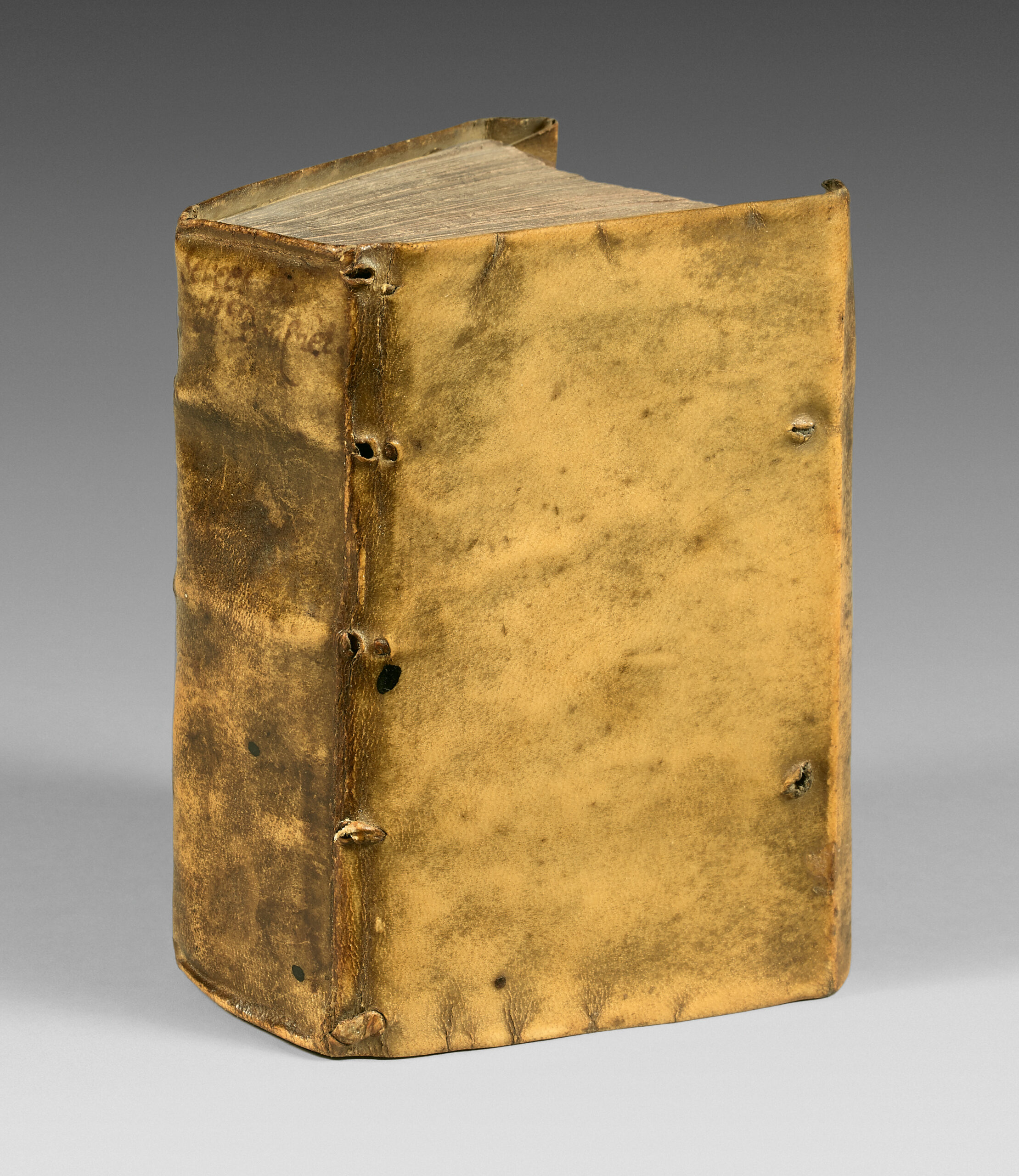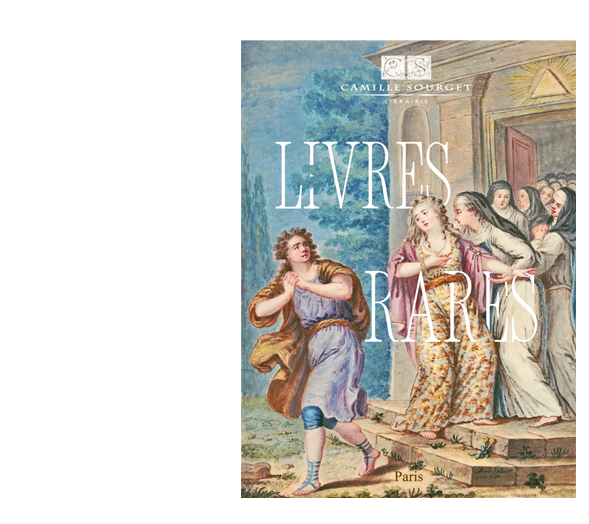Imprimé sur la copie faite à Poitiers, 1585.
Small 12mo of (16) ll., 790 pp. Overlapping vellum, flat spine with title in head, leftover links. Contemporary binding.
115 x 77 mm.
Very rare second edition of this famous collection of conversations and evees, “whose interlocutors are indeed the pupils of Rabelais”.
Tchemerzine, I, 924; Rahir, Bibliothèque de l’amateur, p. 338; Bibliothèque de Backer, 1926, no. 517.
This collection of speeches and evening digressions (“sérées”), made up of erudite and picturesque speeches held in Poitiers in the house of Guillaume Bouchet, was first published in 1584.
Guillaume Bouchet (1513-1594), a wealthy bookseller and publisher from Poitiers, was a lively and subtle conversationalist who, towards the end of his life, produced this collection of the often saucy or licentious table talk of the city’s good bourgeois and intellectuals, which occupied their evenings or “serées”.
Guillaume Bouchet, a friend of Jacques du Fouilloux, belonged to the small group of poets from Poitou who formed around Jean Bastier de la Péruse and Jacques Tahureau in the mid-16th century. He was read by Montaigne and tried to draw inspiration from him.
Two further volumes were published in 1597 and 1598.
This work is a collection of evening tales, anecdotes and bon mots, arranged by subject and supposed to reproduce the after-dinner conversations of a bourgeois circle to which the author belonged.
This type of literature was very popular in the Middle Ages and throughout the Renaissance: consider, for example, Noël du Faïl’s Propos rustiques. The comments are often jocular, sometimes learned, with Bouchet keen to show off his erudition, which sometimes smacks of pedantry. The interest of the book, which is mainly historical, lies in its lively portrayal of the provincial merchant bourgeoisie.
“I regard this book as one of the most curious of this lost species,” says Viollet le Duc. Bouchet gives a serious and facetious commentary in dialogue, which does not exclude gaudy and obscene features: “the free, very pleasant, & gaudy speeches contained in it, are still reminiscent of the old preud’homie of the good old days…”.
And Brunet remarked: “One of those books full of crude obscenities and jibes that one agrees to call facetious, even though they are nothing less than pleasant. They are much sought after, and it is difficult to find well-preserved copies.”
Les Essais by Montaigne :
“The practitioners of the late sixteenth-century form of the ‘conte’, the ‘discours bigarrés’ or hybrid form of tale and discourse clearly counted Montaigne in their number, as they cite the ‘Essais’ and take up the same topics […]. One point in common between the authors of the ‘discours bigarrés’ or the ‘propos de table’, where conversation and anecdotes play off against one another is the ‘ordo neglectus’, the loose structure piecing discourse to narration, argument to illustration that we find in the ‘fricassee’ of Montaigne’s ‘Essais’, the ‘Sérées’ of Guillaume Bouchet, and the ‘Bigarrures du Seigneur des Accords’ of Etienne Tabourot. Jeanneret is quick to point out, however, that although Montaigne owned a copy of Bouchet’s work, and Bouchet borrowed unabashedly from Montaigne, Bouchet recreates entire passages from great Greek and Latin works, while Montaigne selects, reflects, and sets himself apart.
A veritable satirical and moral panorama of the society of its time, this collection is also a philological and historical source that Viollet-le-Duc and Charles Nodier considered to be “the most complete repertory (…) since there have been storytellers and writers who find pleasure in collecting tales”.
The “Sérées” also contain several notes relating to America, such as the meeting in Brazil between a French merchant and an “Ameriquain savage“, as well as remarks on Indian dances, the use of tobacco, etc.
A very pure copy preserved in its original overlapping vellum binding, a rare condition.



